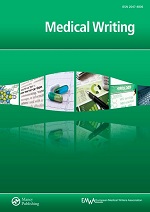
Volume 21, Issue 3 - Writing Matters
Pharmaceutical medical writing competencies: Comparing self-perception with employers' expectations
Authors: Sabrina Heisel-Stoehr, Thomas M. Schindler
Abstract
In the recently published ‘Pharmaceutical Medical Writing Competency Model’, a group of medical writers describes the knowledge, skills, and behaviours they considered essential for successful medical writers. Thus, this model represents a list of essential job requirements from within the medical writing profession. Using the job postings of the EMWA website (in total 146 adverts from 2009 to 2011), we investigated whether the competencies listed in the model are in line with the expectations of the employers of medical writers. In these adverts, we found that familiarity with the techniques of scientific writing and editing, a science background, the ability to comprehend scientific concepts, and the capability to author quality documents were the most frequently mentioned requirements. Generally, the Competency Model matched well with the requirements mentioned in the job adverts. However, certain essential attributes were rarely mentioned in job adverts; examples include proficiency in statistics and knowledge about publication guidelines. With regard to social skills, job adverts tended to ask for more general skills than those described by the Competency Model. The Competency Model distinguishes between publication and regulatory writers, and this distinction was reflected in the attributes mentioned in the job postings with adverts for regulatory medical writers listing a broader skill set than did those for publication medical writers.
 Download the full article
Download the full article
References
- Clemow D, the Drug Information Association Medical Writing Special Interest Area Community Competency Model Working Group. Pharmaceutical medical writing competency model. AMWA J 2011;26(2):62–70.
- Woolley K, Clemow D. Development and practical use of an international medical writer competency model. DIA Global Forum 2010;2(3):8–11.
- Clemow D. Pharmaceutical medical writing competency model: practical applications. AMWA J 2011;26(3):106–10.
- Schindler TM. Reflections on stability? A 3-year analysis of the EMWA website job postings. Write Stuff 2010;19(4):272–4.
- Ely J, Lew R, Woolley K. Manners and more! Importance of cultural sensitivity when medical writers work with authors from the Asia-Pacific region. DIA Global Forum 2010;2(4):20–5.
- Korieth K. Demand for medical writing continues to rise. CenterWatch Monthly 2008;15(12):1–13.
- Witherell G. The importance of medical writers to the success of clinical and regulatory documents. Monitor (Assoc Clin Res Professionals) 2012;16(1):45–8.
Search
Articles
Links
Editoral Board
Editor-in-Chief
Co-Editors
Managing Editor
Victoria White
Deputy Managing Editor
Alicia Brooks Waltman
Associate Editors
Section Editors
AI/Automation
Biotechnology
Digital Communication
EMWA News
Freelancing
Gained in Translation
Getting Your Foot in the Door
Good Writing Practice
Pablo Izquierdo / Alison McIntosh
In the Bookstores
Publications
Medical Communications/Writing for Patients
Medical Devices
My First Medical Writing
News from the EMA
Pharmacovigilance
Regulatory Matters
Regulatory Public Disclosure
Louisa Ludwig-Begall / Sarah Kabani
The Crofter: Sustainable Communications
Veterinary Writing
Editors Emeritus
Layout Designer
Chris Monk
 Visit the EMWA website
Visit the EMWA website